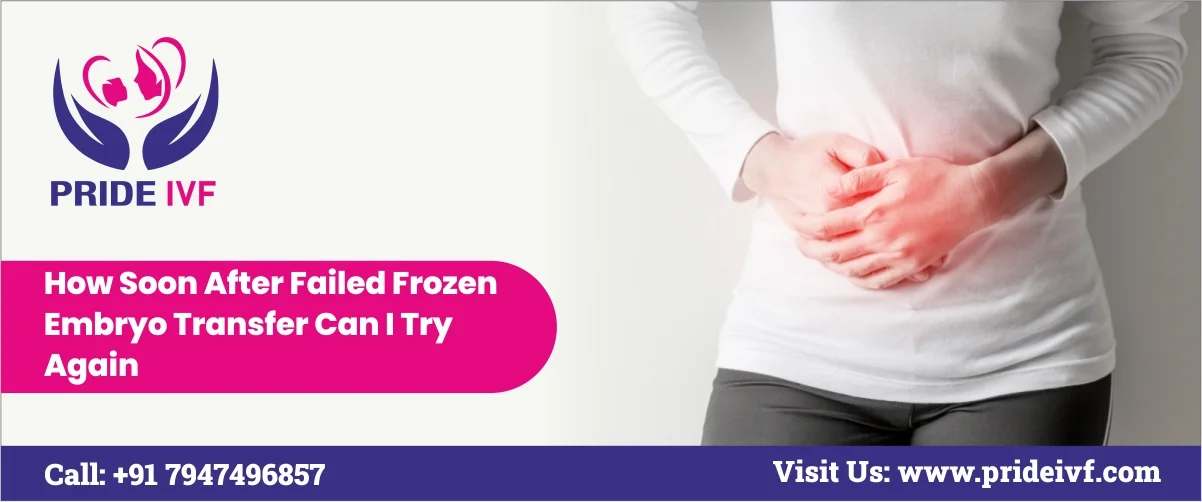One of the most difficult things that may happen to you throughout your reproductive journey is having a frozen embryo transfer (FET) go wrong. Many people, often ask “how soon after failed frozen embryo transfer can i try again” especially couples, struggle with what to do next because of the emotional burden of failure and the desire to have children. It’s normal to want to give it another go as soon as possible, but knowing when to give it another go and the circumstances involved is essential to your mental and physical health.
We will explore the main factors that determine whether, following a failed attempt at frozen embryo transfer, you can try again in this blog. We’ll talk about the medical side, including testing and recuperation, as well as emotional preparedness and doable actions to be ready for your next cycle.
By exploring these topics, we hope to provide clarity and support as you navigate this important phase of your fertility journey.




Knowing Why a Frozen Embryo Transfer Doesn’t Work & Why IVF Fails?
Understanding what a failed frozen embryo transfer involves is important before knowing when to try again. A failed FET usually results in a negative pregnancy test because the embryo does not implant properly in the uterus. This may occur for a number of reasons such as:
- Embryo Quality: Some embryos may not freeze correctly, and some are not viable. Also Read: Why does ivf fail with good embryo?
- Uterine Environment: Implantation may be impacted by conditions that affect the uterine lining, such as hormone imbalances or anatomical problems.
- Genetic Factors: An embryo’s genetic defects may also be a major cause of implantation failure.
How soon after a failed frozen embryo transfer can I try again?
Your personal health, the counselor or your fertility doctor, and your mental preparedness are some of the variables that may influence when you should try again following a failed frozen embryo transfer. These are some broad recommendations:
Medical Evaluation and Recuperation: Your healthcare practitioner might advise taking a brief hiatus following a failed FET to give your body time to mend. Usually lasting one to two menstrual cycles, this time frame might vary. Your physician might advise testing during this period to evaluate your hormone levels and uterine lining in an effort to determine the cause of the failure.
Thoughts Regarding Hormones: Your hormone levels must return to normal before you try another transfer. To make sure your body is prepared for another cycle, your fertility expert will keep an eye on your levels, especially those of progesterone and estrogen. Also Read: What happens to your body after failed ivf?
Ready with Emotions: Recuperation on an emotional level is equally crucial to physical healing. Give yourself time to digest what happened, and if you think you could benefit from counseling or support groups, do so. After one cycle, some people might feel ready to try again, while others might want to take a longer pause.
Adjustments to the Treatment Plan: Your fertility doctor could modify your treatment plan if they find anything that might have led to the unsuccessful transfer. To improve the odds of success in the following cycle, this could involve changing the dosage, transferring patients at a later time, or undergoing additional procedures.
Questions to Ask IVF Doctor After a Failed Cycle
To get clarity and direction for your future actions, it is imperative that you have an honest and open talk with your fertility doctor. Following a failed cycle, you should think about asking your IVF doctor the following crucial questions:
- Potential Causes of the failure: Gaining insight into the reasons behind the cycle’s failure can be quite beneficial. Request an explanation from your doctor on any possible contributing causes, such as hormonal imbalances, diseases of the uterine lining, or embryo quality.
- Ask whether more testing is advised to look into any possible underlying problems. Hormone level measurements, uterus examinations (such a hysteroscopy), or genetic testing of embryos are examples of tests.
- Future for Upcoming Cycles: Inquire about your possibilities of success in next cycles according to your particular circumstances.
- Next action plan: Make it clear what will happen immediately after this. Find out when your next cycle is due, what preparations or medications you need to make, and when your follow-up appointments should be scheduled.
When To Schedule Appointment After Failed IVF?
Although the precise schedule will depend on the particulars of each case, many clinics are generally advised to wait one to two menstrual cycles in order to give your body time to reestablish its natural hormonal pattern and make any required assessments. Based on your physical and mental well-being, a follow-up visit with your fertility expert can help you decide if you’re ready to move forward with another transfer at this point.
- Healthy Lifestyle Options: Pay attention to stress management, eating a balanced diet, and getting frequent exercise. These elements may have a major effect on your general well-being and cycle preparedness.
- Emotional Support: To help you deal with the emotional highs and lows of fertility therapy, reach out to support groups or mental health specialists.
- Knowledge and comprehension: You can ask your fertility expert any questions you have about what to expect during the procedure, any protocol adjustments, and the impending transfer.
How Soon After Failed Frozen Embryo Transfer Can I Try Again?
After a failed frozen embryo transfer, the best time to attempt again is a very personal decision that is impacted by a number of psychological and physiological issues. Although it’s normal to want to go on as soon as possible, giving yourself more time to recover and be ready can increase your chances of succeeding in the following cycle. Recall that you have assistance available to assist you in navigating the challenges of fertility therapy and that you are not alone on this path. Every step you take toward realizing the goal of being a parent eventually brings you closer
We at pride IVF Clinic are quite aware that becoming a parent can be an exciting and difficult experience. In order to help you fulfill your desire of starting a family, our committed team of fertility specialists is here to offer you individualized treatment and cutting-edge reproductive technology. We provide a wide range of services that are customized to fit your specific needs, all while upholding the highest standards of professionalism and compassion.
Our IVF program helps people and couples become pregnant by combining state-of-the-art technology with professional care. We make sure that every stage, from egg harvesting to embryo transfer, is done carefully and precisely.




We are quite known for our:
- Skilled Team: Our clinic employs embryologists, reproductive experts, and support personnel who are all dedicated to providing the best possible treatment.
- Modern Technology: To provide you the best results possible, we make use of the most recent developments in reproductive medicine.
- Personalized Care: We take the time to learn about your particular circumstances and then adjust our treatment programs to suit your requirements.
- Kind Environment: We provide a comforting environment that makes you feel supported and understood at every step of the way.
It might be daunting to start a family, but you don’t have to do it by yourself. We at pride IVF Clinic are available to help you at every stage. Make an appointment for a consultation with us right now to begin living the parenthood of your dreams.
Takeaway
It may be difficult and emotionally draining to navigate the reproductive treatment process, particularly following an unsuccessful frozen embryo transfer. Even while it’s normal to want to give it another go as soon as possible, it’s important to wait until you’re both physically and emotionally ready. Speaking with your fertility professional can help you receive individualized advice and support so that you’re ready for your next try. Recall that every voyage is distinct, and you may increase your chances of success in the future by giving yourself enough time to recover and get ready.
FAQs:
Q) How long after a frozen embryo transfer fails should I wait before trying again?
After a failed FET, most clinics advise waiting one to two menstrual cycles to give your body time to heal and balance your hormone levels. That being said, individual situations may dictate otherwise, therefore it’s imperative to speak with your reproductive professional.
Q) What aspects affect the next time I can try?
The timing might vary depending on a number of things, such as your mental and physical well-being and any modifications that may be required to your treatment plan. Your fertility specialist can assist in evaluating these elements and offer tailored advice.
Q) What changes to my lifestyle will increase my chances of success in the upcoming cycle?
Maintaining a healthy lifestyle might increase your chances of getting pregnant. This include eating a well-balanced diet, exercising frequently, controlling stress, abstaining from tobacco and excessive alcohol, and getting enough sleep.




